
Theodore Sturgeon was an American fiction author of primarily fantasy, science fiction, and horror, as well as a critic. He wrote approximately 400 reviews and more than 120 short stories, 11 novels, and several scripts for Star Trek: The Original Series.
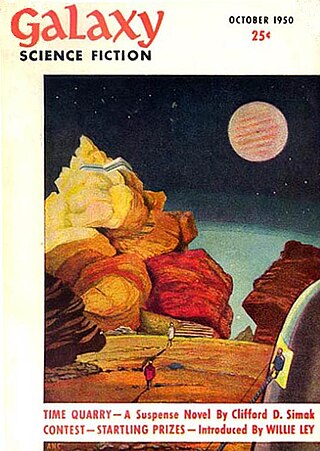
Galaxy Science Fiction was an American digest-size science fiction magazine, published in Boston from 1950 to 1980. It was founded by a French-Italian company, World Editions, which was looking to break into the American market. World Editions hired as editor H. L. Gold, who rapidly made Galaxy the leading science fiction magazine of its time, focusing on stories about social issues rather than technology.

Gordon Rupert Dickson was a Canadian-American science fiction writer. He was inducted into the Science Fiction and Fantasy Hall of Fame in 2000.

The Magazine of Fantasy & Science Fiction is a U.S. fantasy and science-fiction magazine first published in 1949 by Mystery House, a subsidiary of Lawrence Spivak's Mercury Press. Editors Anthony Boucher and J. Francis McComas had approached Spivak in the mid-1940s about creating a fantasy companion to Spivak's existing mystery title, Ellery Queen's Mystery Magazine. The first issue was titled The Magazine of Fantasy, but the decision was quickly made to include science fiction as well as fantasy, and the title was changed correspondingly with the second issue. F&SF was quite different in presentation from the existing science-fiction magazines of the day, most of which were in pulp format: it had no interior illustrations, no letter column, and text in a single-column format, which in the opinion of science-fiction historian Mike Ashley "set F&SF apart, giving it the air and authority of a superior magazine".
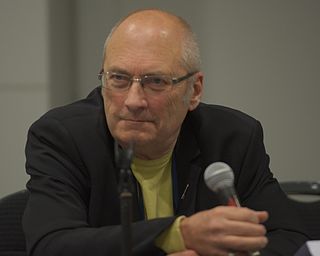
John Frederick Clute is a Canadian-born author and critic specializing in science fiction and fantasy literature who has lived in both England and the United States since 1969. He has been described as "an integral part of science fiction's history" and "perhaps the foremost reader-critic of sf in our time, and one of the best the genre has ever known." He was one of eight people who founded the English magazine Interzone in 1982.

Science Fantasy, which also appeared under the titles Impulse and SF Impulse, was a British fantasy and science fiction magazine, launched in 1950 by Nova Publications as a companion to Nova's New Worlds. Walter Gillings was editor for the first two issues, and was then replaced by John Carnell, the editor of New Worlds, as a cost-saving measure. Carnell edited both magazines until Nova went out of business in early 1964. The titles were acquired by Roberts & Vinter, who hired Kyril Bonfiglioli to edit Science Fantasy; Bonfiglioli changed the title to Impulse in early 1966, but the new title led to confusion with the distributors and sales fell, though the magazine remained profitable. The title was changed again to SF Impulse for the last few issues. Science Fantasy ceased publication the following year, when Roberts & Vinter came under financial pressure after their printer went bankrupt.
Edgar Pangborn was an American writer of mystery, historical, and science fiction.

Paolo Tadini Bacigalupi is an American science fiction and fantasy writer. He has won the Hugo, Nebula, John W. Campbell, Compton Crook, Theodore Sturgeon, and Michael L. Printz awards, and has been nominated for the National Book Award. His fiction has appeared in The Magazine of Fantasy & Science Fiction, Asimov's Science Fiction, and the environmental journal High Country News. Nonfiction essays of his have appeared in Salon.com and High Country News, and have been syndicated in newspapers, including the Idaho Statesman, the Albuquerque Journal, and the Salt Lake Tribune.

Beyond Fantasy Fiction was a US fantasy fiction magazine edited by H. L. Gold, with only ten issues published from 1953 to 1955. The last two issues carried the cover title of Beyond Fiction, but the publication's name for copyright purposes remained as before.
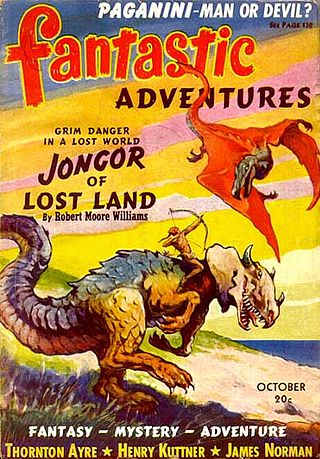
Fantastic Adventures was an American pulp fantasy and science fiction magazine, published from 1939 to 1953 by Ziff-Davis. It was initially edited by Raymond A. Palmer, who was also the editor of Amazing Stories, Ziff-Davis's other science fiction title. The first nine issues were in bedsheet format, but in June 1940 the magazine switched to a standard pulp size. It was almost cancelled at the end of 1940, but the October 1940 issue enjoyed unexpectedly good sales, helped by a strong cover by J. Allen St. John for Robert Moore Williams' Jongor of Lost Land. By May 1941 the magazine was on a regular monthly schedule. Historians of science fiction consider that Palmer was unable to maintain a consistently high standard of fiction, but Fantastic Adventures soon developed a reputation for light-hearted and whimsical stories. Much of the material was written by a small group of writers under both their own names and house names. The cover art, like those of many other pulps of the era, focused on beautiful women in melodramatic action scenes. One regular cover artist was H.W. McCauley, whose glamorous "MacGirl" covers were popular with the readers, though the emphasis on depictions of attractive and often partly clothed women did draw some objections.

The Dreaming Jewels, also known as The Synthetic Man, is a science fiction novel by American writer Theodore Sturgeon. It was his first published novel.
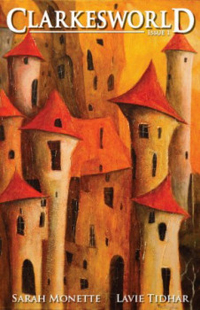
Clarkesworld Magazine is an American online fantasy and science fiction magazine. It released its first issue October 1, 2006, and has maintained a regular monthly schedule since, publishing fiction by authors such as Elizabeth Bear, Kij Johnson, Caitlin R. Kiernan, Sarah Monette, Catherynne Valente, Jeff VanderMeer and Peter Watts.

The 1987 Annual World's Best SF is an anthology of science fiction short stories edited by Donald A. Wollheim and Arthur W. Saha, the fourteenth volume in a series of nineteen. It was first published in paperback by DAW Books in June 1987, followed by a hardcover edition issued in July of the same year by the same publisher as a selection of the Science Fiction Book Club. For the hardcover edition the original cover art by Tony Roberts was replaced by a new cover painting by Richard Powers.
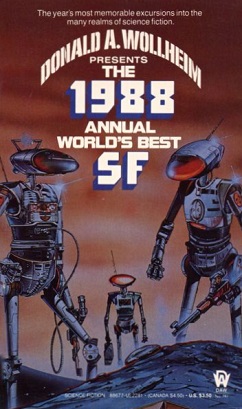
The 1988 Annual World's Best SF is an anthology of science fiction short stories edited by Donald A. Wollheim and Arthur W. Saha, the seventeenth volume in a series of nineteen. It was first published in paperback by DAW Books in June 1988, followed by a hardcover edition issued in August of the same year by the same publisher as a selection of the Science Fiction Book Club. For the hardcover edition the original cover art by Blair Wilkins was replaced by a new cover painting by Richard Powers.
Will McIntosh is a science fiction and young adult author, a Hugo-Award-winner, and a winner or finalist for many other awards. Along with ten novels, including Defenders, Love Minus Eighty, and Burning Midnight, he has published dozens of short stories in magazines such as Asimov's Science Fiction, Strange Horizons, Lightspeed Magazine, Clarkesworld, and Interzone. His stories are frequently reprinted in different "Year's Best" anthologies.

Terry Carr's Best Science Fiction and Fantasy of the Year #16 is an anthology of science fiction short stories edited by Terry Carr, the sixteenth and last volume in a series of sixteen. It was first published in hardcover by Tor Books in September 1987. The first British editions were published in hardcover and paperback by Gollancz in December of the same year, under the alternate title Best SF of the Year #16.
Rachel Swirsky is an American literary, speculative fiction and fantasy writer, poet, and editor living in Oregon. She was the founding editor of the PodCastle podcast and served as editor from 2008 to 2010. She served as vice president of the Science Fiction and Fantasy Writers of America in 2013.

Ken Liu is an American author of science fiction and fantasy. Liu has won multiple Hugo and Nebula Awards for his short fiction, which has appeared in F&SF, Asimov's, Analog, Lightspeed, Clarkesworld, and multiple "Year's Best" anthologies.

Alpha 8 is a science fiction anthology edited by American writer Robert Silverberg, first published as a paperback original by Berkley Medallion in November 1977. No further editions have been issued.
The Science Fiction Awards Database (SFADB) is an index of science fiction, fantasy, and horror awards compiled by Mark R. Kelly and published by the Locus Science Fiction Foundation. Known formerly as the Locus Index to SF Awards, it has been cited as an invaluable science fiction resource, and is often more up-to-date than the awards' own websites.














